Format

The Internet Yami-Ichi
Sofia Braga (IT), IDPW (JP)
Shut down your computer and join the third edition of The Internet Yami-Ichi in Linz! The Internet Yami-Ichi derives from the Japanese for "Internet Black Market," but also for "sickness" and "addiction." It is a flea market where people consumed by the Internet can share and buy Internet-related things in real life.

Austria in Space Garden
Austria in Space (AT)
Austria in Space is more than just another website. It is THE place for Space in Austria. At the Ars Electronica Festival, the Austria in Space initiative will present some of their program highlights and show how relevant Austrian innovations are to the global space exploration sector.

Robots in Action - fast and sensitive!
Institute of Robotics, Johannes Kepler University Linz (AT)
Robots can be strong and sensitive at the same time! They can move extremely fast but also handle fragile objects like champagne glasses. Imagine you want to carry a tray with several glasses of filled liquid without spilling –and you may even be adventurous and try to wave the tray over your head. Most of us will fail to perform such a stunt without breaking some glasses, but our robots are smart and agile enough to do just this. The Institute of Robotics at Johannes Kepler University will open its lab and showcase what modern industrial robotics are, and how fun they can be.
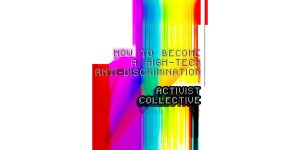
Nushin Isabelle Yazdani und Internet Teapot (Karla Zavala und Adriaan Odendaal): [d/r]econstructing AI - dreams of visionary fiction and zine-making
How to Become a High-Tech-Anti-Discrimination Activist Collective
With this workshop we investigate the structures behind algorithmic decision making systems, discuss why their design is normative, and how AI systems reinforce structural discrimination. We embark on a speculative journey and discuss how to design to create a more just world. Which artists inspire us? Which values are important to us? We want to collect our thoughts and creative outputs in a zine.

LAB ON STAGE (Adriana Torres Topaga, Martyna Lorenc and Andrea Maria Handler): Phantom Data in our bodies and imagination
How to Become a High-Tech-Anti-Discrimination Activist Collective
This workshop undertakes a performing arts’ approach. Our departure is the embodiment of imagination and perceptual processes. With somatic exercises and performative games, we notice the data flowing in from our bodies: sensation, image, emotion or memory. Imagination has its own training dataset - therefore a specific priming/bias/imprint. We look for practices of becoming aware of HOW we imagine things and what escapes our field of attention.

Astrid Mager und Hong Phuc Dang: How to create your own AI device with SUSI.AI - An Open Source Platform for Conversational Web
How to Become a High-Tech Anti-Discrimination Activist Collective
The workshop introduces SUSI components like SUSI’s technology stack, its wiki-like skill editor and hardware prototype; participants work together to create a simple bot, develop new skills and test them. A reflection on data bias and algorithmic discrimination invites to collectively think about creating non-discriminatory digital technologies.

Doris Allhutter: “When I encountered discriminating IT-systems and did not want to take it anymore” - deconstructing affective entanglements in society-technology relations
How to Become a High-Tech Anti-Discrimination Activist Collective
This workshop uses the deconstructive method of mind scripting to understand the grip that even technologies that we reject may have on us. Using our own memories as an experimental resource we will explore how discrimination and privilege materialize in our practices. This aims at developing collective agency and activisms.

Safiya Umoja Noble: Algorithms of Oppression - How Search Engines Reinforce Racism
How to Become a High-Tech Anti-Discrimination Activist Collective
The landscape of information is rapidly shifting as new demands are increasing investment in digital technologies. Yet, critical scholars continue to demonstrate how many technologies are shaped by and infused with values that are not impartial, disembodied, or lacking positionality. Technologies hold racial, gender, and class politics. In this talk, Dr. Safiya Noble will discuss her recent book, Algorithms of Oppression, and the impact of technology on the public.

Lisa Nakamura: Estranging Digital Racial Terrorism After COVID
How to Become a High-Tech Anti-Discrimination Activist Collective
This talk argues that COVID-19 forced an accelerated migration to digital networks that exposed new audiences to traumatically racist digital events as well as new openings for critique and resistance.
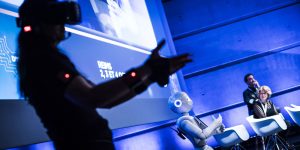
The Woman-Machine
le lieu unique (FR)
The Woman-Machine is a two-day event on the main stage of le lieu unique. In response to La Mettrie (and Kraftwerk) le lieu unique invites artists, scientists and performers to discuss the relationship between AIs and gender, robots and feminism, machine learning and the world after the pandemic.

How to Become a High-Tech Anti-Discrimination Activist Collective
IFG-LIT (AT)
New technologies have penetrated all aspects of our lives and promise a wide range of improvements and efficiencies. Contrary to general perception, though, the algorithms on which these technologies are based are neither neutral nor do they treat everyone equally.
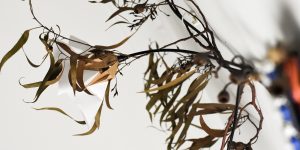
Beside the Nibelungen bridge & Oribokit: Gardening for Robots
Studio Matthew Gardiner (AU)
Wherever you are today and whenever you may have sat or stood somewhere, late late late at night, in Linz, this work is for you, this work invites you use our AR gadgets to place a Wurststand in your town, or place a Leberkässemmel on your plate at home. Share a post and write a short memory of a day (or night) at an Ars Electronica Festival.

Agora Digitalis
Agora Digitalis is the Interface Cultures’ meeting point during the 2020 Campus Exhibition. The general idea behind it is to create an informal setting where students, (future) makers and future students can meet and become acquainted with Interface Cultures. Agora Digitalis is a physical and virtual place where everyone should be able to share and express their ideas

Magic Darts or, when every throw is a perfect hit
Andreas Stelzer (AT), Rudolf Scheidl (AT)
Darts is a popular game, but difficult to master. In this version of darts, players always hit the bullseye. What looks like witchcraft is revealed as a mechatronic system, with a novel microwave sensor network and ultrafast hydraulic actors interacting. Such technologies will affect our future daily life, e.g. in self driving cars, with microwaves allowin us to see in the dark, with fog or dust; or in exoskeletons, where hydraulic actuation enables ultimate compactness.
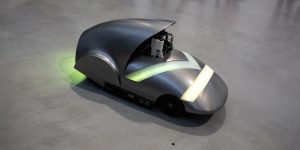
K – JKU’s Interactive Robocar
Institute for Machine Learning, LIT AI Lab, LIT Robopsychology Lab, Johannes Kepler University (AT); Inseq Design (AT)
K is a likeable little robocar: small in size, but very smart on board! Named after JKU’s famous patron, Johannes Kepler, it drives itself autonomously on changing terrain, can predict the movement patterns of pedestrians and playfully interacts with its environment.
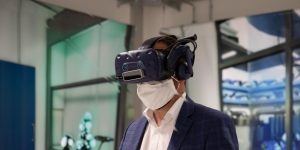
Robots Talking To Me
LIT Robopsychology Lab, Johannes Kepler University (AT)
How should robots communicate with people? What voice makes AI assistants sound trustworthy? Do we even have to listen to robots or should we always be in command ourselves? Under the title *Robots Talking to Me*, the *LIT Robopsychology Lab* presents four installations that give tangible expression to questions of human-machine relationships and invite participation.
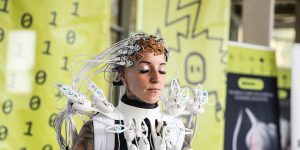
The Pangolin Scales
Thomas Faseth (AT), Harald Pretl (AT), Christoph Guger (AT), Anouk Wipprecht (NL)
The Pangolin Scales demonstrates the world’s first 1.024 channel brain-computer interface (BCI), which is able to extract information from the human brain with an unprecedented resolution to control an interactive, fashionable dress.
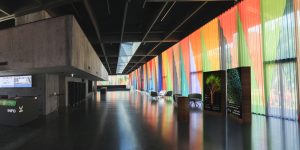
Treeversity
Johann Höller (AT), Thomas Lorenz (AT), Florian Gruber (AT), Ursula Niederländer (AT), Tanja Illetits-Motta (AT), Raphael Blasi (AT), Andreas Rösch (IT), Stefan Küll (AT)
Treeversity focuses on the relation between Big Data and data visualization to convey complex information at a glance. A mirror of the university’s inner workings, diligently recording success, failure and evolution. A portrait of its life in the form of a tree. Courses, grades and exams become branches, creating many different trees. Fully grown or nascent, withering or growing erratically. Treeversity shows the university as a forest, providing a tool to analyze its mechanisms at the same time.

Exposed Building
Michael Roland (AT), Michael Mayr (AT), Robert Holzinger (AT), Markus Vogl (AT)
By opening a maintenance hatch and hacking into the network infrastructure behind it, we acquire access to the electronic locking system. By controlling the buzzers built into the office door locks, we transform the Science Park 2 building into an orchestra and it resounds like a huge walk-in instrument. The installation playfully provokes thought about the vulnerability of modern technology and its growing risks for society.
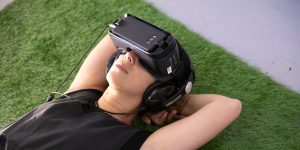
State of Intimacy
Interface Cultures, University of Art and Design Linz
In the field of media art and technology we often discussed, until recently, how to design intimate technology. And the desire to be departing, like Harry Potter, from Platform 9 ¾ seemed to be a major incentive for augmenting and mixing realities. Until last spring, when the University of Art and Design in Linz had to close and a lockdown immersed us all, unwillingly, in a virtual world whilst the physical world seemed to be replaced by daily statistics. This is the context for the Interface Cultures students who worked, for the full 2020 summer semester, in confinement on their projects for this exhibition.


